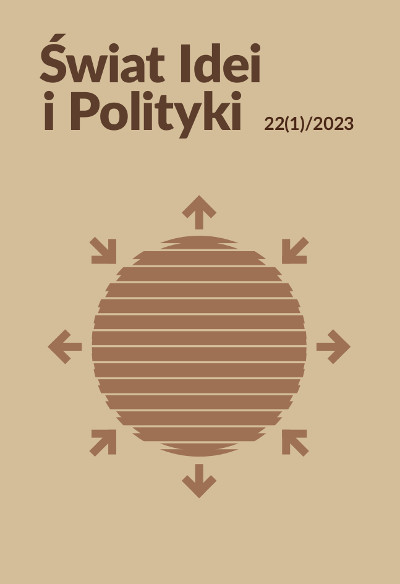About Rapallo. Reflections on German-Russian relations 1918–1922
DOI:
https://doi.org/10.34767/SIIP.2023.01.04Keywords:
Germany, Soviet Russia, the Bolsheviks, the Treaty of Versailles, the Treaty of Rapallo, the interwar periodAbstract
The subject of this article is the relationship between Germany and Soviet Russia – two countries that felt excluded from the postwar international order established by the Treaty of Versailles. In defeated Germany, after the suppression of attempts at revolution, there was a clash of different visions of foreign policy, including policy toward Russia. The victory of the Bolsheviks in the civil war and the strengthening of their power in Russia meant that pragmatism and the desire for closer political cooperation, which would also allow the implementation of Germany’s economic interests, prevailed in German policy towards that state. The inclination of both countries to strengthen cooperation was also reflected in the decision on Germany’s neutrality during the Polish-Soviet War in 1920, which in practice favored Russia. The Treaty of Rapallo of April 1922 became a symbolic confirmation and at the same time the beginning of the intensification of Soviet-German cooperation. The article uses the method of document and literature research based on studies in Polish, German, Russian, and English.
References
Davies, N. (2018). Orzeł biały, czerwona gwiazda. Wojna polsko-bolszewicka 1919–1920. Kraków: Społeczny Instytut Wydawniczy Znak.
Ein Zeuge der Tage von Rapallo (1972, Dezember). Osteuropa, 22, 12.
Ellyson Wagner, D.W. (1961, January). Alfred von Kiderlen-Wächter. A Statesman of Imperial Germany. Library Gazette, 35, 3.
Fink, C. (1984). The Genoa Conference. European Diplomacy 1921–1922. North Carolina: University of North Carolina Press.
Friedensvertrag zwischen Deutschland, Österreich-Ungarn, Bulgarien und der Türkei einerseits und Rußland andererseits (Der Friedensvertrag von Brest-Litovsk) (1918, 3 März).
Gatzke, H.W. (1956, January). Von Rapallo nach Berlin. Stresemann und die deutsche Russlandpolitik. Vierteljahreshefte für Zeitgeschichte, 1.
Gloger, K. (2017). Fremde Freunde. Deutsche und Russen. Die Geschichte einer schicksalhaften Beziehung. München: Berlin Verlag in der Pieper Verlag GmbH.
Haupts, L. (1984). Graf Brockdorff-Rantzau: Diplomat und Minister in Kaiserreich und Republik. Göttingen – Zürich: Muster – Schmidt Verlag.
Himmer, R. (1976, June). Rathenau, Russia, and Rapallo. Central European History, 9, 2.
von Hoetzsch, O. (1925, Oktober). Das neue deutsch-russische Vertragswerk. Osteuropa, 1, 1.
von Hoetzsch, O. (1926, März). Der „Berliner Vertrag” vom 24. April. Osteuropa, 1, 6.
Ingeborg Fleischhauer, E. (2006). Rathenau in Rapallo. Vierteljahresschrifte für Zeitgeschichte, 3.
Jędrzejewska, I. (2005). Współpraca Armii Czerwonej i Reichswehry w latach 1917–1933 (wybrane problemy). Toruń: Wydawnictwo Europejskie Centrum Edukacyjne.
Kłusek, M. (2007). Polityka Gustava Stresemanna wobec ZSRR w latach 1923–1929. Toruń: Wydawnictwo Adam Marszałek.
Kochan, L (1955). Russland und die Weimarer Republik. Düsseldorf: Müller – Albrechts Verlag.
Krasuski, J. (1986). Historia Rzeszy Niemieckiej 1871–1945. Poznań: Wydawnictwo Poznańskie.
Krasuski, J. (1975). Stosunki polsko-niemieckie 1919–1932. Poznań: Instytut Zachodni.
Marthius, G. & Rapoport, A. (1926, Mai/Juni). Die rechtlichen Grundzüge der deutschrussischen Verträge vom 12. Oktober 1925. Osteuropa, 1, 8/9.
Mikulicz, S. (1966). Od Genui do Rapallo. Warszawa: Książka i Wiedza.
Mikulicz, S. (1964). Traktat w Rapallo. Roczniki Historyczne, 30.
Pajewski, J. (1963). Problem polsko-niemiecki w traktacie wersalskim. Poznań: Instytut Zachodni.
Proceedings of the Brest-Litovsk Peace Conference. The Peace Negotiations between Russia and the Central Powers. 21 November, 1917 – 3 March, 1918 (1918). Washington: Government Printing Office.
Schieder, T. (1956). Die Probleme des Rapallo-Vertrages. Eine Studie über die deutsch-russischen Beziehungen 1922 bis 1926. Wiesbaden: Springer Fachmedien Wiesbaden.
Schwabe, K. (1998). Germany’s Peace Aims and the Domestic and International Constrains. W: M.F. Boemeke, G.D. Feldmann & E. Glaser (red.), The Treaty of Versailles. A Reassement after 75 Years. New York: Cambridge University Press.
Senn, A.E. & Goldberg, H.J. (1979, December). The Assassination of Count Mirbach. Canadian Slavonic Papers, 21, 4.
Skrzypek, A. (1992). Niespełniony sojusz? Stosunki sowiecko-niemieckie 1917–1941. Warszawa: Wydawnictwo Naukowe PWN.
Traktat pokoju między mocarstwami sprzymierzonemi i skojarzonemi i Niemcami, podpisany w Wersalu dnia 28 czerwca 1919 roku (1920). Dz.U. nr 35.
Садовая, Г.М. (2009). Роль интеллигента Георгия Чичерина в нормализации советско-германских отношений (январь – март 1922 г.). Вестник Самарского государственного университета, 1 (67).
Документы внешней политики СССР. Tом второй, 1 января 1919 г. – 30 июля 1920 г., Министерство иностранных дел СССР (1958). Москва: Госполитиздат.
Документы внешней политики СССР, Том четвертый. 19 марта 1921 г.-31 декабря 1921 г. (1960). Москва: Госполитиздат.
Русско-германский добавочный договор к Мирному договору между Россией, с одной стороны, и Германией, Австро-Венгрией, Болгарией и Турцией — с другой, Берлин, 27.08.1918 (1968). W: Советско-германские отношения от переговоров в Брест-Литовске до подписания Рапалльского договора, T. 1. 1917–1918. Москва: Политиздат.


